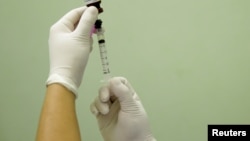Researchers in Brazil have developed a vaccine designed to fight addiction to cocaine and its potent derivative crack — by preventing addicts from feeling the effects of the drugs and helping them stay on track for recovery.
The drug, known as Calixcoca, was developed by a team at Brazil's Federal University of Minas Gerais. Preliminary tests on animals were positive and the drug is set to move to human trials.
Should it receive regulatory approval, the drug would be the first vaccine used to fight cocaine addiction, said the coordinator for the research team, psychiatrist Frederico Garcia.
Garcia told Agence France-Presse the drug works by prompting the body to produce anti-cocaine antibodies that bind to the drug, making them too large to pass into the brain's mesolimbic system, or "reward center," where the drug normally stimulates high levels of pleasure-inducing dopamine.
Testing suggests the drug also could reduce the risk of overdosing, as cocaine molecules, bound to the antibodies produced by the vaccine, would be unable to act on the heart or the arteries.
Tests on pregnant rats indicated the antibodies are passed on through a mother's milk, suggesting the vaccine could protect nursing babies as well.
Garcia cautioned the vaccine would not be a panacea and said it would be most helpful for recovering addicts who do not want to get hooked on the drug again following rehabilitation.
He said clinical trials conducted by Brazil's health regulator Anvisa will be needed to determine how the drug might be used and discover any side effects or long-term impact on a patient's health.
The research team received a $530,000 award last week for their work, sponsored by the Brazil-based pharmaceutical company Eurofarma.
Some information for this report was provided by Agence France-Presse.





